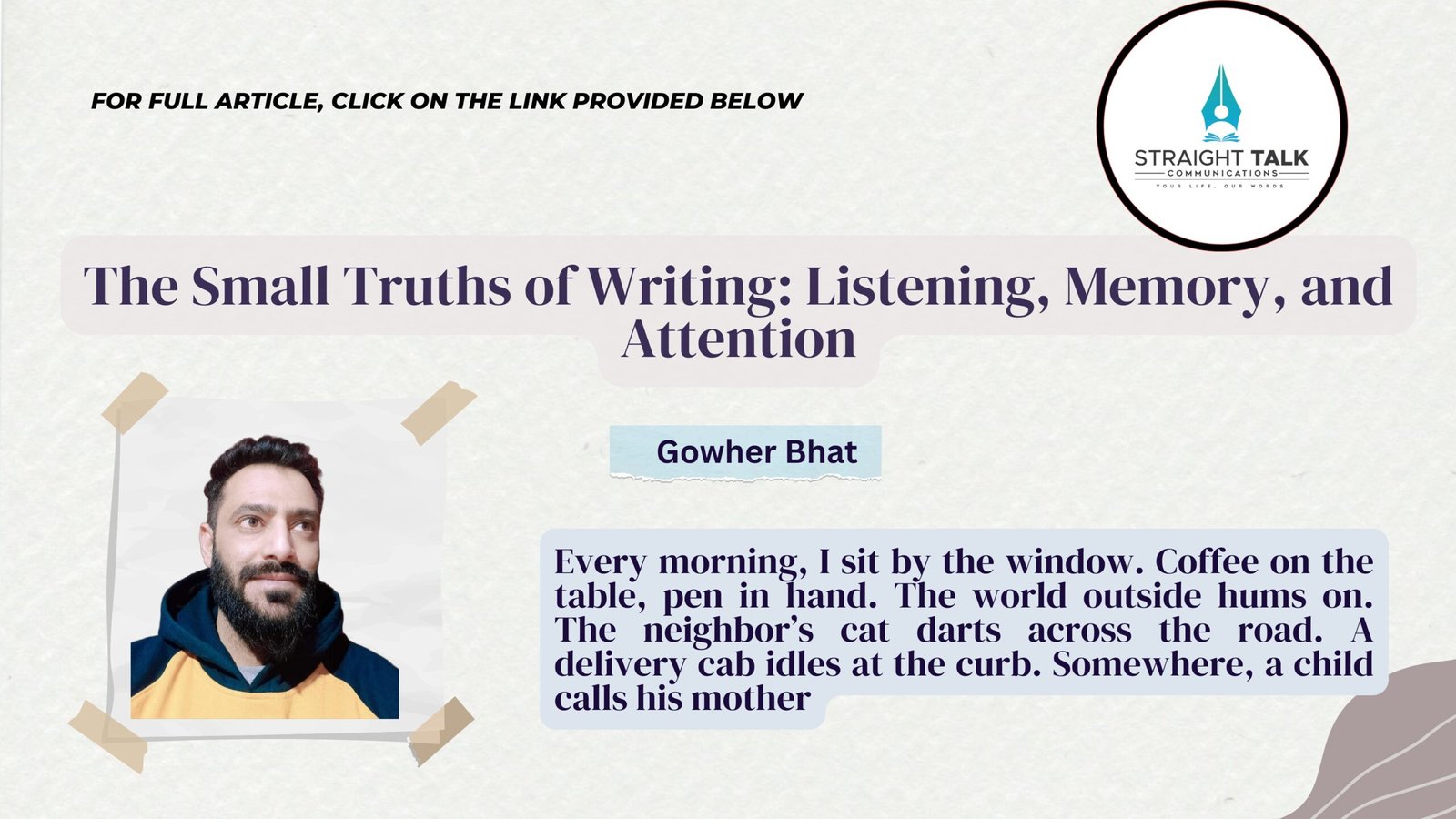The Small Truths of Writing: Listening, Memory, and Attention

Gowher Bhat
Every morning, I sit by the window. Coffee on the table, pen in hand. The world outside hums on. The neighbor’s cat darts across the road. A delivery cab idles at the curb. Somewhere, a child calls his mother. The smell of damp earth rises as the first light touches the roofs.
I’ve come to believe writing isn’t about grand ideas or clever words. It’s about listening. Paying attention. To the scrape of a chair against the floor. To the way someone’s voice rises at the end of a sentence. To the way the light shifts after sunrise, how it bathes the room in a quiet glow
Some days, the words don’t come. I sit for hours, tapping the pen against the paper, watching shadows lengthen across the walls. I think about the stories I’ve heard. The man at the tea stall who told me about his son moving to Dubai. The woman on the train reading a letter with trembling hands. These moments linger, forming a quiet reservoir that I return to.
Writing, I’ve learned, is less about invention and more about memory. Noticing what’s already there. The way your father folded his handkerchief before slipping it into his pocket. The weight of the grocery bag you carried home from the corner shop, the ache in your wrist. The quiet of a room after an argument, punctuated by the steady ticking of the clock.
This simple act of attention is not just poetic sentiment—it is supported by science. Research from the University of California, Berkeley has highlighted how focused observation enhances creativity and problem-solving abilities. Deep reading—a process where we pause, reflect, and absorb—improves our capacity for empathy and complex thinking, as explained by neuroscientist Dr. Maryanne Wolf.
In India, where life often blurs into noise and rush, writers like Ruskin Bond and Aravind Adiga remind us of the importance of listening. Bond’s gentle tales of Mussoorie capture the subtle rhythm of life: a man mending his roof, a boy chasing a kite, a family gathering at dusk. Adiga’s narratives, by contrast, peel back the layers of society to reveal the quiet tensions beneath. Both teach us that storytelling is as much about what is left unsaid as what is written.
It’s also about curiosity. Asking why someone hesitated before answering. Why a friend never returned a borrowed book. Why certain faces remain in our minds long after we’ve forgotten their names. Why a smell—freshly baked bread, wet earth, camphor—can transport us back decades.
And it’s about rhythm. The spaces between words. The pauses. The quiet between thoughts. Writing, like music, needs silence to breathe. Without the rests, the notes lose meaning. The page, too, needs its white spaces.
I don’t think of myself as a writer with answers. Most days, I just show up. I sit with the pen and paper. I wait. I listen.
In our digital age, where distractions are constant and endless, the need for focused presence is critical. Cal Newport, in his seminal book Deep Work, notes that the ability to engage in undistracted, focused work is becoming increasingly rare but also incredibly valuable. Those who cultivate it—whether in writing, art, or business—tend to produce higher-quality work and experience deeper satisfaction.
Neuroscience backs this up. Engaging in creative practices like writing stimulates the brain’s default mode network, linked to introspection and memory processing. This network, researchers suggest, allows us to make deeper connections between ideas, to reflect on the past, and to imagine the future. Writing from observation and memory is not just an artistic practice—it’s a cognitive exercise that strengthens our ability to think deeply and creatively.
I think back to the man I met on the Delhi Metro. He spoke softly, telling me about his village in Himachal Pradesh. Of apple orchards heavy with fruit, of snow-covered roofs in winter. His story, shared in a few quiet sentences, lingered with me for months. Later, I wrote a short story inspired by his memories. That story wasn’t about him, but it was born from that brief meeting. In that moment, I realized that writing doesn’t require a grand narrative. It begins with a single detail—a voice, a memory, an image.
Toni Morrison once said, “If there’s a book that you want to read, but it hasn’t been written yet, then you must write it.” Her reminder is not just about originality but about honoring the small, unrecorded moments that might otherwise be lost. The fleeting gesture of a stranger. The way the sky darkens before a storm. The unspoken grief in someone’s eyes.
In India, where the literary landscape continues to grow, many emerging writers are turning to personal essays and memoirs, exploring the intersections of identity, memory, and history. According to a 2020 Nielsen India report, nonfiction—particularly personal narratives and memoirs—has seen a 20% year-on-year growth in readership, reflecting readers’ desire for authentic, reflective stories.
The truth is, writing is not about perfection. It’s about honesty. About putting into words what we observe and remember. About trying to leave a trace of the world as it is, not as we wish it to be. The novelist Anne Lamott calls this “shitty first drafts”—the idea that our first attempt doesn’t need to be perfect; it just needs to be honest.
So I return each morning. The coffee cools. The pen scratches against paper. I listen—to the rustle of leaves, a neighbor’s cough, the memories that float in and out of consciousness. I wait for a phrase, a sentence, a small truth to reveal itself. Some days, it comes easily. Other days, it takes hours. But always, the process begins with paying attention.
One line. Then another. A paragraph. A page. In time, the story emerges. Not perfect, not profound, but real.
And that I believe is what writing truly is: the simple, quiet practice of paying attention.
(Gowher Bhat is a freelance journalist, published author, creative writer, and educator)







